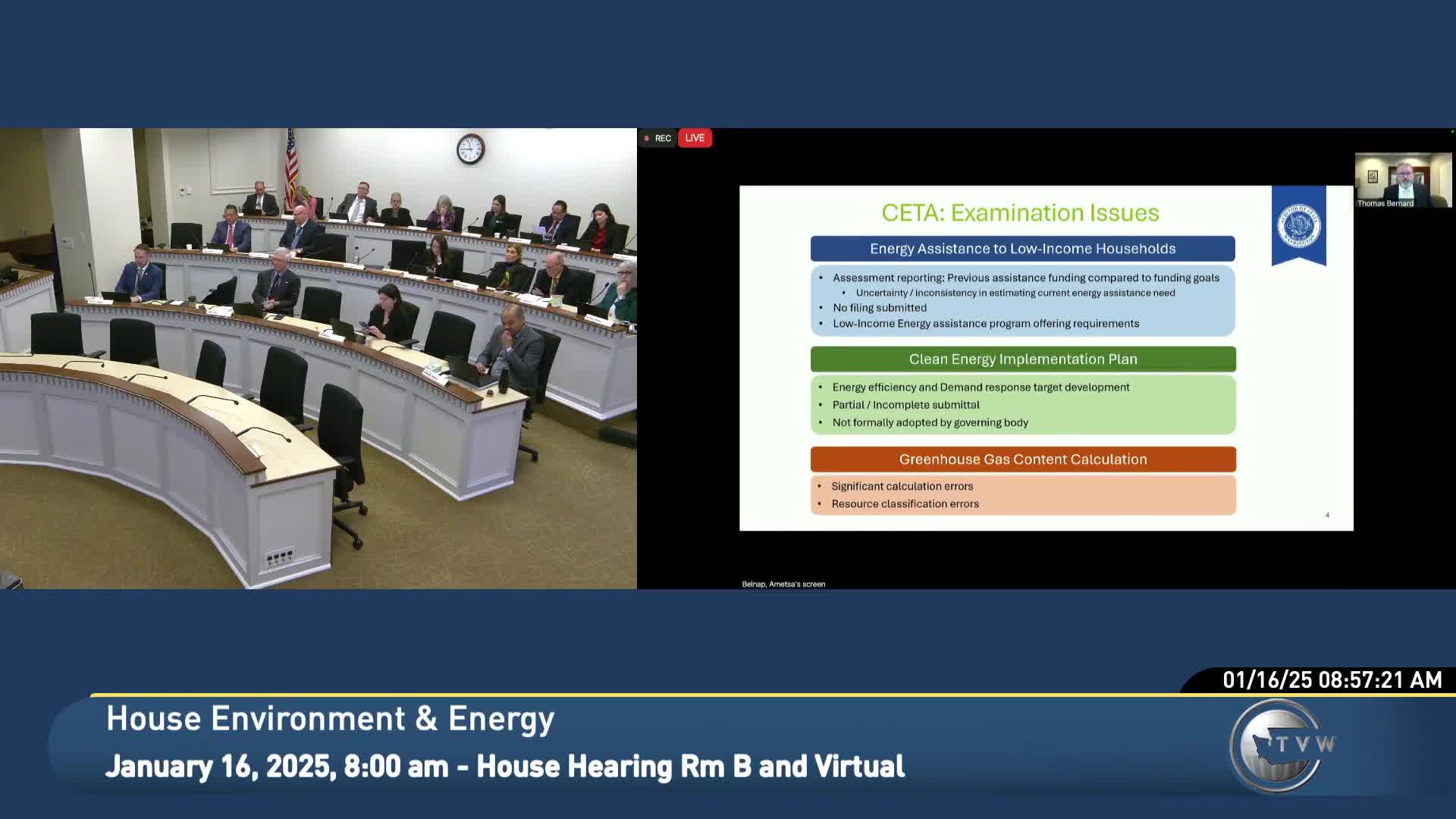Officials brief committee on Clean Energy Transformation Act progress, highlight compliance gaps and reliability questions
Get AI-powered insights, summaries, and transcripts
Subscribe
Summary
State commerce, the Utilities and Transportation Commission and the State Auditor told the Environment & Energy Committee that Washington is moving toward CETA targets but faces audit findings, planning shortfalls and near‑term reliability questions tied to natural gas use, transmission constraints and uneven utility reporting.
At a meeting of the Environment & Energy Committee, state energy officials updated lawmakers on implementation of the Clean Energy Transformation Act (CETA), outlining the law’s timelines, where utilities stand today and areas regulators and auditors say need more work.
Glenn Blackman, Director of the Energy Policy Office at the Washington Department of Commerce, summarized the core CETA standards and timelines and described the law as "Washington's landmark 100 Percent Clean Electricity Law enacted in 2019." He told the committee the statute sets three staged targets: no coal in retail Washington utility portfolios by 2025; a 2030 "greenhouse gas neutral" standard that allows up to 20% unspecified or fossil‑derived power paired with alternative compliance; and a 2045 requirement that electricity serving Washington customers be 100% renewable or non‑emitting with no alternative compliance option.
The nut of the briefing: the state has clear multi‑year targets, but compliance paths vary by utility and sector, and near‑term operational and reporting issues could affect how smoothly the transition happens. "We will have an electricity system that's clean, affordable, reliable and equitable," Blackman said, adding that the Commerce fuel‑mix disclosure reports are useful indicators but not the final compliance accounting.
UTC commissioner Anne Rendell described the commission’s role for investor‑owned utilities and listed recent regulatory actions. "The commission is responsible for only regulating private investor owned utility and transportation companies," Rendell said, and noted that Avista, Pacificorp and Puget Sound Energy filed clean energy implementation plans that the UTC has reviewed, approved with conditions or is litigating. She summarized approved targets for the investor‑owned utilities and said the commission has imposed conditions to ensure demand‑side measures and metrics are included in plans.
Rendell and Blackman both emphasized resource adequacy and variability as central operational concerns. They said seasonal hydro variability, contracting and supply‑chain delays since 2020 have affected the timing of clean resources coming online and the year‑to‑year fuel mix the public sees in disclosure reports. Rendell said utilities "don't really have to provide targets or didn't have to provide targets for 2020 and 2021 because the 4 year plan began in 2025," but that the UTC will consider prudence and good faith when evaluating compliance at the end of the first four‑year period.
Committee members focused questions on affordability, low‑income assistance and whether reliance on natural gas during peaks will undermine the law’s goals. Blackman and Rendell repeatedly said CETA includes both an allowance and an off‑ramp for reliability: the 2030 standard permits up to 20% natural gas or unspecified power for the average year, and the law allows temporary suspensions when reliability requires it. Rendell told the committee that utilities "need to keep the lights on" and that the commission will consider whether operational decisions were prudent "when we determine enforcement and compliance."
Thomas Bernard, energy program manager at the Washington State Auditor’s office, briefed the committee on audits of consumer‑owned utilities’ CETA compliance filings for the period 2019–2021. He said the auditor’s office has issued 31 audit reports so far with eight remaining, and that larger utilities were generally well resourced while many smaller consumer‑owned utilities struggled with new analytic and reporting requirements. The auditor identified recurring problems: missing or incomplete low‑income energy assistance assessments and biennial reports; forward‑looking energy efficiency and demand‑response assessments that were not done or were treated as backward‑looking averages; incomplete report templates; and occasional greenhouse‑gas content calculation errors. Bernard said the auditor can only review compliance after actions are taken: "We can only come in after the fact and talk about what they did as opposed to what they're planning to do."
Bernard enumerated how those findings translated into opinions: among municipal utilities audited to date some were noncompliant because they failed to submit complete clean energy implementation plans or required energy‑assistance filings by statutory deadlines; several consumer‑owned utilities were cited as partially compliant for incomplete templates or missing assessments. The auditor's office said it is working with Commerce and the Attorney General’s office to educate smaller utilities during audits and expected to finish the consumer‑owned utility audit cycle by the end of the first quarter of 2025.
Where things stand next: Commerce said consumer‑owned utilities will file their first four‑year progress reports in July of next year and begin a second compliance period in January 2026; the UTC is finishing rulemaking to support market participation and to clarify how production‑based and emissions‑based accounting interact; and auditors will continue issuing findings and working with utilities. Officials recommended continued coordination among Commerce, the UTC and the State Auditor to deliver consistent guidance and to consider prudence, equity and affordability in compliance reviews.
The committee did not take any formal votes; the presentations were informational and followed by member questions. The agencies said they will return to the Legislature with rulemaking, guidance and reports as the statutory compliance periods advance.
